- Home
- Priscilla Royal
Wine of Violence mm-1 Page 7
Wine of Violence mm-1 Read online
Page 7
Gytha looked as if she were about to cry.
“Which is why you should stay and serve me. I fear I need the ordeal for the good of my soul.”
“Bless you, my lady!”
Gytha fell to her knees, reached out and kissed Eleanor’s hem. Then the girl began to weep.
“Child, never do that again! I am not Our Lady and am certainly no saint.” Eleanor lifted her up and hugged her.
“Nonetheless, you are kind.” Gytha smiled and rubbed her hand across her eyes.
“Perhaps, but let us be clear on a few things.”
The girl nodded eagerly.
“The cat? Oh, be at ease, child! He stays. Indeed, a house dedicated to God is no place for killing a harmless creature. If he is such a fine hunter, the kitchen will find good use for him. We have few enough things from our garden as it is without the mice taking a share. I will introduce him to Sister Edith. Should you see him in here, however, let him be.”
“Of course, my lady, and willingly!” Gytha grinned.
“But keep your own dinner scraps for better use. I will make sure the kitchen trades him meals for mice. After all, we do pay for good service. And lest you fear he will lose in this bargain, I will have his food sent here where you may feed him yourself.”
The girl grinned wider. “Agreed!”
“And one last thing, Gytha.”
“Yes, my lady?”
“I will expect you to always speak your mind to me.” Eleanor hesitated. “Although it might be best if you did so only when we were alone together.”
Gytha giggled.
“And I must trust you always to tell me the truth. Is that agreed?”
“Always, my lady!”
As the girl went to bring wine for the two nuns, Eleanor turned to look up at Sister Anne. The expression of absolute delight and understanding she saw in the older woman’s face brought her a warmth and comfort she had not felt since she had left Amesbury. Perhaps she had gained one ally amongst her nuns.
Chapter Twelve
A morning mist with the softness of tears caressed the faces of those who stood, heads bowed, on the day Brother Rupert was buried. As befitted a cleric vowed to chastity, only the monks clustered around the simple grave of their brother. Prioress Eleanor and the nuns of Tyndal honored him by standing at a distance sufficient to show respect for his vows even after death. Prior Theobald, supported by Brother Andrew and Brother Simeon, quietly spoke the last words that ever would be said over the priest’s now discarded, silent, and rotting body.
For those whose first thought was for Brother Rupert’s soul, it was a time of joy. For those who had loved the kindness of the mortal man, it was a time of very human grief as well as horror at the manner of his leaving them. When Eleanor looked around her, she saw more tears slipping down the cheeks of her charges, many of whom lowered their heads to hide them. Only the wide blue eyes of Sister Christina were free of tears and raised to heaven. Only on her smooth face was there a smile of happiness.
The service ended. Eleanor turned and gestured to the nuns, allowing them to return to the cloister, but Sister Ruth remained, lost in thought, her eyes moist as she gazed down her long, narrow nose at the damp grass around her feet.
Eleanor reached over and put her hand on the nun’s shoulder. “Walk back with me, sister.”
Ruth nodded. Her eyes, raised to meet Eleanor’s ever so briefly, were black with sadness. For once the familiar look of bitterness was absent from them.
“He was a good man, Brother Rupert,” Eleanor said.
The nun hesitated. “For a mortal one, yes.” Her voice was harsh from soundless weeping.
“And one who did not merit such a death.”
The two women walked together in silence. Their breathing and the gravel grinding under their feet with a harsh scraping noise were the only sounds in that rain-laden air.
“I wonder that no one saw anything strange that day,” Eleanor asked at last.
“I saw nothing, my lady,” Ruth replied, pursing her lips in what was becoming a very familiar expression. Eleanor wondered if the look was indicative of anger or just plain stubbornness.
“I am sure you did not or you would have reported it to me,” Eleanor said, rather doubting that the porteress would have done any such thing. “Brother Rupert’s corpse did not find its way into the cloister garth by itself, however. Haven’t you heard anything from anyone who might have seen something out of the way?”
“This horrid act might not be the work of a mortal man. Satan is capable of wondrous things.”
“The Evil One rarely expends such energy unless his purpose in astounding us is clear and will bear good fruit, however. The point of leaving our poor priest’s mutilated body near the fountain remains a mystery. Thus I doubt bearing it there was the direct action of Satan, wondrous though he may often be.”
Ruth sniffed audibly and raised her head. “Brother Simeon believes it is a warning against lust. He noted that Brother Rupert was far too fond of Prioress Felicia and was spending more time with her than was seemly near the end of her life. I, too, noted that with some dismay.”
“If his mutilation was a warning against lust,” Eleanor said, feeling somewhat uncomfortable on that subject in view of her own weakness for the auburn-haired Brother Thomas, “it was no work of Satan. The Prince of Darkness would surely choose to paint a more appealing picture of its consequences.” She took a deep breath. “Tell me, was my honored predecessor ill long?”
Ruth blinked at the sudden shift in subject. “Not long at all. She felt pain in her chest and collapsed at Compline. By Matins her soul had left us.”
Then most likely her death was a natural one, Eleanor thought. “And her age? I was never told.”
“We understood she had entered her seventh decade.” Sister Ruth’s expression had changed to one of puzzlement.
Eleanor shook her head. Brother Rupert had been of much the same age, perhaps a few years younger. She discounted uncontrollable lust between priest and prioress or even in the heart of the priest alone as the cause of his death. As the all too palpable dream of Tyndal’s young new priest that had visited her last night had taught her, the pain of passion burned with unbearable sharpness in youth. It was as consolation that her aunt had told her that the sting grew more blunted in well-advanced years, although it was never entirely banished. How she wished she had reached that stage of life!
“Did you have further need of me, my lady?”
Eleanor blinked. She had been woolgathering over her dream of last night and hadn’t realized that she and Sister Ruth were now standing in the passage leading to the nuns’ quarters.
“One moment more, sister. On the first day of my tenure here, Prior Theobald honored me by leading us all in prayer. I understand Brother Rupert usually did so when Prioress Felicia was still alive and would then attend her chapters.”
Sister Ruth nodded.
“Did you expect Brother Rupert to come to my first chapter?”
“Prior Theobald had sent me a message through Brother Simeon that he might not. His absence from nuns’ chapter was infrequent but not, certainly, uncommon.”
Sent a message to Sister Ruth, Eleanor noted with irritation, but not to her as prioress. “Did he give a reason for the absence?” she asked, her voice calm.
“It was not my place to ask.”
“Yet you said nothing when I asked Sister Christina if she had seen him. You knew I was expecting him.”
“You did not ask me, my lady, and I would never presume to know what is in the mind of my superior.”
Despite the sharp retort, Eleanor noted with interest that the nun had paled slightly. Indeed, she suspected that Sister Ruth either knew more about all this than she was telling or that she simply would not give even an inch of cooperation to the woman who had displaced her. The moment of human weakness Ruth had shown at the burial had passed, and the nun’s expression hardened into a mask. Eleanor knew she would get nothing more
from her.
“Very well, sister. I will not keep you longer.”
As the prioress watched Ruth walk hurriedly through the cloister toward the Chapel of St. Mary Magdalene, she could not help wondering if her haste was due to something other than an urgent need to pray.
Chapter Thirteen
Thomas’ eyes stung with hot tears as he sat by the bedside. The body lying there had been a boy of no more than six years. Now he was a corpse without age, slack-jawed and staring atop a reeking puddle of black flux. This fate will befall us all, he thought with bitterness. Brother Rupert lies a week in the ground, melting into worm food. This child dies. Death cares naught for goodness, beauty, innocence nor wit. In the end, we shall all stink just the same.
“Grieve not, brother. You gave him comfort, which is more than many of us are able to do for those facing death.”
Thomas started. The hand on his shoulder was not that of Sister Anne.
Brother Andrew smiled, a look that held no humor but some gentleness. “I have seen you sitting with the dying, and I overheard you tell this child that Our Lord would have a puppy for him to play with in Heaven,” he said, gesturing tenderly at the soft corpse. “Your words made him smile. That was kindness, brother. You made it easier for him to endure his pain. I think you have a talent for comfort, a talent I’ve not often seen, let alone in someone of your priestly inexperience.”
“You are kind, brother.” Thomas stood and looked down at the small monk. “But you look as if you are in pain. Are you ill?”
Andrew snorted. “My leg. It distresses me when the air turns chill or damp. I am used to it, although I still have little patience despite much prayer. Sister Anne has remedies which ease the aches.”
“Surely you are too young for an old man’s pains,” Thomas said, grinning.
“They are from an old wound, brother, gotten in a battle for a cause which died with its leader but not, perhaps, in the spirits of men.”
“You have returned from the Holy Land then?”
“Nay. I was with Simon de Montfort and should have died on the field from my wounds. Or else been hanged, drawn, and quartered as a traitor to King Henry.”
“My apologies, brother. I should not have pried.”
Andrew looked up at Thomas and laughed, eyes sparkling with good humor. “Nor would I have told you except you remind me much of the man who gave me this bad leg and then saved me from a traitor’s death by granting my wish to retire from the world. He was an earl who fought on King Henry’s side, but he showed a knight’s compassion toward this humble man whom he deemed a worthy opponent in face to face combat. Oh, but he was a fine fighter!” The monk smiled at the memory. “Indeed, you have his voice, his look and his breadth, although not his coloring. Strange, that.”
Thomas felt his face turn cold, then blazing hot.
“Methinks I, too, have pricked an old wound? But fear not, brother. You may keep your secrets. It is part of the human condition to have something buried deep in the heart, and we monks of Tyndal are no different from any other mortal man in that.”
“Even Prior Theobald?” Thomas asked, his laugh harsh with fear at the monk’s quick perceptions. It would be wise, he decided, to maneuver the conversation into safer and more profitable areas. Indeed, that earl might well have been Thomas’ own father.
“Even he, although his more spirited sins must now be as shriveled as ancient husks. We are used to his failings, yet respect his office and, out of kindness, pretend that all orders are his rather than issuing from others with his voice. I am not alone in feeling only pity for him.”
“Others being Brother Simeon?”
“A man of great competence and perhaps even greater ambition, but the latter serves both the priory and God well. We may lose him one day to Amesbury. If God is kind, he may stay with us and become prior here when Prior Theobald is called to Heaven.”
“Then surely Brother Receiver has no dark secrets.”
Andrew folded his arms and lowered his head. “His ambition for advancement within the Church is no secret, but he exercises a shrewd humility. Although Brother Simeon has long ruled us here at Tyndal, he gives credit for everything he does to our prior. Such humility will serve him well with others of higher rank who would profit from competence in underlings but wish the glory to fall on themselves. No, if our receiver has a secret, it may be his grief. He once said that he admired his father above all other men, but less than two years ago, his father died. Brother Simeon was inconsolable for many months. We feared he would lose either his reason or his faith. Once in chapel I overheard him praying that the cup be taken from him. Apparently, God was gracious. The good brother has since regained his spirit and strength.”
“He does not seem happy with our new prioress.”
“Prioress Felicia was not a forceful leader. She was happiest working with the nuns or the hospital and let Brother Simeon run the estates as well as rule the monks and lay brothers on Prior Theobald’s behalf. Prioress Eleanor seems more in the tradition of Fontevraud women. He will find the change difficult.”
“And what think you of being ruled by a woman?”
Andrew chuckled. “Our new prioress, despite her youth, reminds me much of my own mother. Now there was a woman who knew how to order about the sons of Adam! And we all loved her, we did, including my father. This will be no change for me, brother. It is like going home.”
***
Thomas knelt in solitude on the rough stones of the darkening Jesus Chapel, the monks’ private place of prayer on the left of the church nave. The boy’s death earlier that day had dug into his soul like a dark-hued worm, and he needed a comfort no mortal could give.
But he could not pray; his thoughts hugged the earth with a fierce tenacity. In truth, he had been unable to pray since the day he was thrown face down on the slimy straw of that rotting dungeon floor. After his release and transfer to Grovebury, a downy-cheeked priest had told him that failure at prayer proved Satan’s hand clutched his soul. He advised Thomas to battle against such possession with the whip, the hair shirt and rejection of all earthly desires. Although he had smiled with some acidity at the young priest’s naïveté, he did feel as if some malign force was crushing all spark of light from his spirit. And so he did try them, the whip and hair shirt, but they had accomplished nothing.
If Satan was offering bribes for his soul, he was doing it in a very unorthodox manner. Thomas no longer suffered from fleshly passions. He did not lust after women, either when he was awake or during the vulnerability of sleep. He ate because food was placed before him but did so with neither hunger nor eagerness, and he drank only to keep his throat from drying to dust.
And as if some part of him was truly eager for it, he needed no awakening for prayer. Indeed he was grateful when they all shuffled down to the chapel for Matins. It was torture, lying motionless in his bed with neither thought nor action to pass the interminable black minutes before sunrise. Although his eyes burned and his body ached from lack of rest, it was during Matins when he felt nearest to prayer, surrounded by the warmth and breath of his brother monks.
Now he was alone. His prayers swirled briefly in the air like lightly disturbed dust before drifting to the floor as soon as he had said them. He dropped his hands, leaned back on his heels, and turned his thoughts to more worldly things.
Although he had been sent to Tyndal to test his investigative prowess in what would probably be a minor and temporary matter of priory insolvency, he found himself settling into the place as if it were a new home. Despite the desolate location, the inhabitants were much like the men he was used to, although some of those men now inhabited the bodies of women, he thought with a smile. An interesting twist on traditional views, for cert.
However, if he wished Tyndal to be the place where he could lift his spirits and refresh his soul, God had played an ugly joke on him. Instead of granting Thomas peace and distance from his tortured memories, God had greeted him with the sight of Bro
ther Rupert’s horribly mutilated dead body before he had even spent a night within the priory walls. No matter that the murderer would be found eventually, Thomas would keep the image of Brother Rupert’s obscenely mangled corpse forever in his collection of night terrors, which visited him on those rare occasions when he actually slept.
Would that the murderer be quickly found! The idea that he might strike again in such a blasphemous way was a thought too macabre to live with. Despite the astute observations of Sister Anne and Thomas’ own discovery of the dead monk’s crucifix outside the sacristy, however, Crowner Ralf had yet to find more evidence and apprehend the culprit, secular or religious.
If only Thomas knew why the monk had been so treated, perhaps he could await the murderer’s capture with less terror, knowing how to protect himself from a similar fate. But he did not, and his imagination, colored with abnormal fatigue, sometimes let loose images of such ghoulish morbidity that he started at strange, demonic shapes he thought materialized in the shadows of his restless nights.
Thomas heard himself mewl like a babe in fear and he ground his hands into his eyes, forcing himself to turn his thoughts to the mundane task he had been sent to investigate. He took in a deep breath and just as slowly exhaled. With an exasperating sluggishness, calm returned to his overburdened soul.
Brother Simeon. He was, without doubt, a vain man, even pompous, but he was also competent. That reputation was known at Grovebury, and Brother Andrew had confirmed the general opinion. Thomas had also found the receiver vigorous and jovial, the kind of man who drew boys, just on the brink of manhood, to him. A man who’d stand, legs splayed, with a waster in hand, one of those blunt wooden practice swords, and invite the lads to fight with him. Afterward he’d cuff them like a great bear; show them skills to save their lives, which he’d call little tricks; praise them for their recklessness, which he’d call courage; and then slip them treats like the children they still were. Thomas had known a man like that when he was a boy and the memory warmed him briefly. Of course a man like Simeon would emerge a leader in this world of sometimes childlike monks.

 The Twice-Hanged Man
The Twice-Hanged Man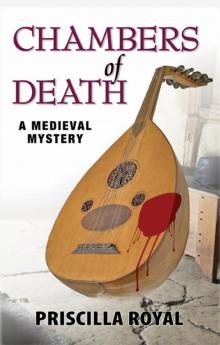 Chambers of Death mm-6
Chambers of Death mm-6 Forsaken Soul
Forsaken Soul Covenant With Hell (Medieval Mysteries)
Covenant With Hell (Medieval Mysteries)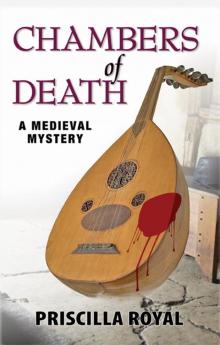 Chambers of Death
Chambers of Death Tyrant of the Mind
Tyrant of the Mind Wild Justice
Wild Justice Sorrow Without End
Sorrow Without End Wine of Violence
Wine of Violence Tyrant of the Mind mm-2
Tyrant of the Mind mm-2 The Sanctity of Hate
The Sanctity of Hate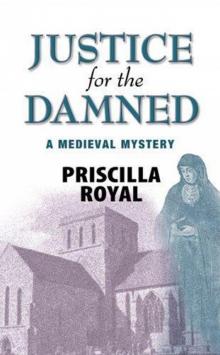 Justice for the Damned
Justice for the Damned The Proud Sinner
The Proud Sinner A Killing Season mm-8
A Killing Season mm-8 Forsaken Soul mm-5
Forsaken Soul mm-5 Valley of Dry Bones mm-7
Valley of Dry Bones mm-7 Valley of Dry Bones
Valley of Dry Bones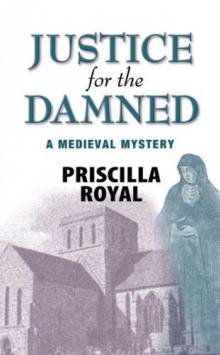 Justice for the Damned mm-4
Justice for the Damned mm-4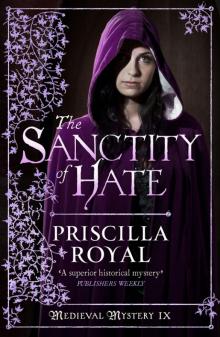 Sanctity of Hate
Sanctity of Hate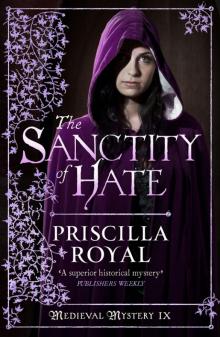 Sanctity of Hate mm-9
Sanctity of Hate mm-9 Wine of Violence mm-1
Wine of Violence mm-1